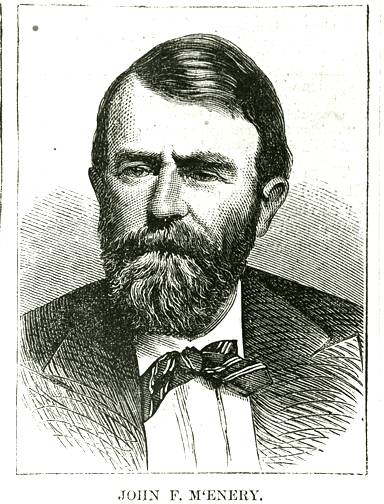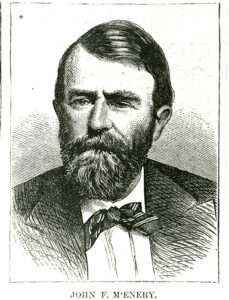John McEnery
In 1872 John McEnery was elected governor in one of the most controversial and bizarre elections in Louisiana history.

Courtesy of The Historic New Orleans Collection
John McEnery. Unidentified
In 1872 John McEnery was elected governor in one of the most controversial and bizarre elections in Louisiana history. Though Governor Henry Clay Warmoth declared McEnery the victor, the state elections returning board split into two rival panels after the election. One panel supported Warmoth and proclaimed victory for McEnery, while the other contended that Radical Republican William Pitt Kellogg won the election. As a result, Louisiana effectively had two governors and two legislatures, each claiming to be the official government. President Ulysses S. Grant attempted to settle the dispute on May 22, 1873, recognizing Kellogg as governor, but McEnery and his supporters continued to protest the election results.
Born in Petersburg, Virginia, on March 31, 1833, John McEnery was the son of Henry O’Neil McEnery and Caroline H. Douglas McEnery, and the older brother of Samuel Douglas McEnery, who served as the governor of Louisiana between 1881 and 1888. The family moved to Monroe, Louisiana, in 1835. McEnery attended Hanover College in Indiana and received a law degree from the University of Louisiana (now Tulane University) in New Orleans. After graduation, he practiced law in Monroe and married Mary G. Thompson of Monroe in 1856; the couple had six children.
McEnery’s first elected position was to the Ouachita Parish Police Jury, where he served until President James Buchanan appointed him registrar of the state land office in Monroe in 1857. When the Civil War began, McEnery served as a captain in Company B of the 4th Battalion of the Louisiana infantry; he was promoted to a major in March 1862. Two months later, he rose to the rank of lieutenant colonel and fought in Virginia and the Carolinas. In 1865 McEnery was elected judge of the Twelfth Judicial District in Confederate Louisiana, but the war ended before he could assume office. Though he was elected to the state legislature in 1866, Union officials refused to let him—and other avowedly pro-Confederates—take office.
After the 1872 gubernatorial campaign, McEnery and his followers were charged with fraud and corruption—as was the party of his opponent, William Pitt Kellogg. When a US district court declared Kellogg the winner, McEnery and his supporters formed a “rump” or alternative legislature. In the next few years, tensions between the two sides contributed to a series of violent confrontations including the Colfax Massacre in April 1873 and the Coushatta Massacre in August 1874. In September of that year McEnery’s faction occupied the state house and armory in New Orleans (then the state capital), forcibly removing Kellogg from office. This incident, often referred to as the Battle of Liberty Place, brought national attention to the state. Despite the pro-McEnery force’s temporary victory, President Ulysses Grant ordered federal troops to restore order to the city and Kellogg to the governorship.
Fearing further violence, McEnery finally submitted to Grant’s orders. Though he was himself never formally recognized as the governor of Louisiana, his brother Samuel McEnery became governor in 1881. John McEnery practiced law in New Orleans until his death in New Orleans on March 28, 1891.
This entry was adapted from Arthur W. Bergeron, Jr.’s entry for the Dictionary of Louisiana Biography, a publication of the Louisiana Historical Association in cooperation with the Center for Louisiana Studies at the University of Louisiana, Lafayette.
Sources: The National Cyclopedia of American Biography (1892-1906), X; Alcée Fortier, Louisiana, 3 vols. (1914); New Orleans Daily Picayune, March 29, 1891.
